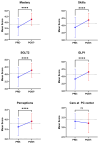Increasing Self-Efficacy for the Management of Patients with Type 2 Diabetes Through an Advanced Practice Education Program for Primary Care Professionals
- PMID: 39728641
- PMCID: PMC11676394
- DOI: 10.3390/nursrep14040280
Increasing Self-Efficacy for the Management of Patients with Type 2 Diabetes Through an Advanced Practice Education Program for Primary Care Professionals
Abstract
Background/objectives: Previous studies have shown that primary care (PC) professionals have a low knowledge about the management of patients with type 2 diabetes, despite being one of the most common chronic diseases. The objective of this study is to analyze the impact of an educational program for health professionals on the metabolic control of their patients diagnosed with type 2 diabetes.
Methods: This work follows a quasi-experimental longitudinal design following a double perspective. First, an educational intervention was conducted on primary care health professionals. Previous diabetes knowledge was evaluated on 157 PC health professionals. Those with lower knowledge scores (<3.5 out of 7) were allocated to the intervention group. An 8-week advanced education program was conducted on 77 PC health professionals. Self-efficacy and quality of care were evaluated. Second, a prospective cohort study was conducted to evaluate changes in metabolic parameters in their patients with type 2 diabetes. A total of 4099 patients with type 2 diabetes attending PC services were divided depending on the formation of health professionals. Biochemical and other clinical parameters were determined at baseline and after 12 months; the study was allocated in the Primary Health Centers of Meuhedet North District (Israel), from January 2022 to June 2023. Changes from the baseline were compared using ANOVA. Additionally, a mixed-effect model was conducted to capture variability within primary care staff and between groups of patients.
Results: The education program significantly improved health staff knowledge (p < 0.001) and all dimensions of self-efficacy (p < 0.001 in all cases). These improvements were mirrored in patients' outcomes, since those managed by health professionals attending the advanced practice education showed, after 6 months, better glucose (p < 0.001), HbA1c (p < 0.001), and eGFR (p = 0.006) levels.
Conclusions: The advanced practice education program oriented to PC professionals was able to significantly improve their self-efficacy and perceived quality of care, which induced a significant effect on metabolic markers of patients with type 2 diabetes. Overall, the data reinforce the usefulness of advanced education programs, especially in chronic complex diseases like type 2 diabetes.
Keywords: advanced practice; education; health staff; knowledge; primary care; self-efficacy; type 2 diabetes.
Conflict of interest statement
The authors declare no conflicts of interest.
Figures





References
-
- United States Census Bureau 2020 Census: 1 in 6 People in the United States Were 65 and Over. [(accessed on 30 July 2024)]; Available online: https://www.census.gov/library/stories/2023/05/2020-census-united-states....
-
- McDowell J., Lindsay G., McPhail K. Development of a Questionnaire to Determine Professionals’ Attitudes to Type 2 Diabetes. J. Res. Nurs. 2007;12:365–370. doi: 10.1177/1744987107076073. - DOI
-
- Weekes L.M., Lembke K.A. Improving Use of Medicines and Medical Tests in Primary Care. Springer; Berlin/Heidelberg, Germany: 2020. A Program to Improve Management of Patients with Type 2 Diabetes; pp. 161–182. - DOI
LinkOut - more resources
Full Text Sources
Research Materials
Miscellaneous

